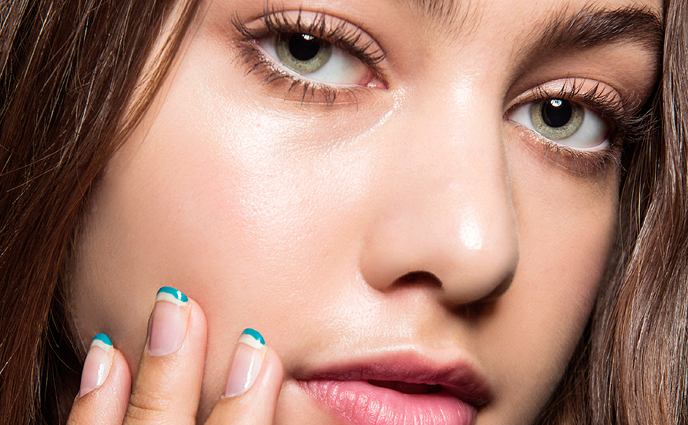It can be -- for some. Like this user on imgur, who documented the first five months of her face transformation on birth control. Her before and after pictures are a pretty convincing argument in favor of using birth control to tame breakouts.
If you're new to the acne battlefield, one of the first questions a dermatologist will ask is if you're on birth control. That's because for a lot of women, that little packet of once-daily pills is a godsend. In fact, a 2014 study found that the birth control may be better than oral antibiotics at clearing skin long term.
Though not everyone experiences this kind of about-face. Your results largely depend on which birth control you choose and the ultimate wild card in the war against acne: your genetics.
If you're new to the acne battlefield, one of the first questions a dermatologist will ask is if you're on birth control. That's because for a lot of women, that little packet of once-daily pills is a godsend. In fact, a 2014 study found that the birth control may be better than oral antibiotics at clearing skin long term.
Though not everyone experiences this kind of about-face. Your results largely depend on which birth control you choose and the ultimate wild card in the war against acne: your genetics.
Acne begins with androgens, a group of hormones that includes testosterone. When this group of hormones is triggered (which can happen for many different reasons, including increased stress, your period and lack of sleep), your skin becomes more inflamed and starts to produce more sebum, the oil in your pores. Dead skin cells and dirt mix with the oil to create a blockage, causing even more oil to back up. Because of the plug, bacteria get trapped under the skin. And just like that, a pimple is born.
Many birth control pills contain forms of estrogen and progesterone, which can block or lower the androgens, keeping your oil production from going into overdrive.
Many birth control pills contain forms of estrogen and progesterone, which can block or lower the androgens, keeping your oil production from going into overdrive.
Whether you have hormonal acne (around the chin and mouth area), bacteria-based acne (which can happen anywhere, but isn't typically associated with the painful, deep spots that crop up around your period) or cystic acne, which never seems to come to a head, Lortscher says that essentially all acne can be treated with birth control. "Pretty much any acne is driven by hormones, which is why eight-year-olds don't have acne," says Lortscher. He says that anyone who has the P. Acnes bacteria also likely has hormonal imbalances driving oil production. And, get this: the oil feeds the bacteria, which then creates an even bigger mess. It's literally a vicious cycle.
Saying that birth control treats acne comes with a really, really important-to-note asterisk. Only some birth controls treat acne. Others, like those that mimic progesterone, may make it worse.
A study that Lortscher and Admani authored analyzed over 2,000 women on birth control, and found that a combination of estrogen and progesterone were most effective forms of birth control for acne. That includes brands like Yaz, Ocella and Ortho Tri-Cyclen. NuvaRing also reportedly improved acne, though not as much as the combination oral pills.
Curology has a handy interactive guide where you can type in your brand of birth control to see where it falls on the acne improvement scale.
A study that Lortscher and Admani authored analyzed over 2,000 women on birth control, and found that a combination of estrogen and progesterone were most effective forms of birth control for acne. That includes brands like Yaz, Ocella and Ortho Tri-Cyclen. NuvaRing also reportedly improved acne, though not as much as the combination oral pills.
Curology has a handy interactive guide where you can type in your brand of birth control to see where it falls on the acne improvement scale.
On the other side of things, IUDs like Mirena and Skyla made most women's acne worse, as did the Depo-Provera shot, which delivers hormones over a period of 12 weeks.
Of course, this also varied by case. While 36 percent of women surveyed said Mirena made their skin worse, 54 percent said it had no effect, and 10 percent said it helped a little bit or significantly.
If you have tricky skin, you may want to steer clear of long-release forms of birth control because those are progestin-only drugs and are more likely to cause acne, according to Admani. It's easy to quit a daily pill if your skin freaks out, but much harder (and potentially painful) to remove an IUD. The same goes for the depot injection. "Once you get the depot shot, it's in your body. You can't get rid of it," says Admani.
Of course, this also varied by case. While 36 percent of women surveyed said Mirena made their skin worse, 54 percent said it had no effect, and 10 percent said it helped a little bit or significantly.
If you have tricky skin, you may want to steer clear of long-release forms of birth control because those are progestin-only drugs and are more likely to cause acne, according to Admani. It's easy to quit a daily pill if your skin freaks out, but much harder (and potentially painful) to remove an IUD. The same goes for the depot injection. "Once you get the depot shot, it's in your body. You can't get rid of it," says Admani.





